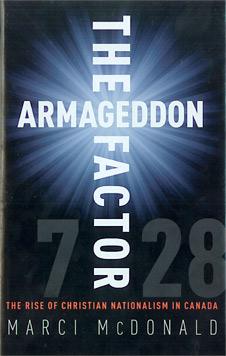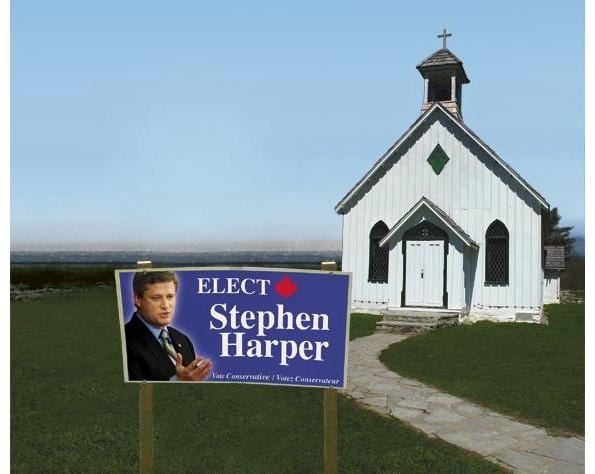From the moment I began this book, I was confronted by skeptics who insist that a truly influential religious right could never take root in Canada. For some, that denial seemed like an exercise in wishful thinking, a refusal to face the possibility that the idea of the country they cherish—liberal, tolerant, and not given to extremes of action or belief—might not be in sync with the changing reality. Others argued that if a Christian right did exist here it would have burst fully formed onto the political scene, a carbon copy of that in the U.S. — raucous and confrontational, openly pulling the strings of the Conservative Party and captained by outspoken television preachers with millions of viewers ready to respond to their bidding. But the American movement has had more than three decades to take shape and flourish; by the time scholars and the mainstream media noticed, it had already infiltrated nearly every level of government from school boards to the Senate, often by stealth.
In this country, where the CRTC has kept the reins on religious broadcasting and Catholics make up a larger proportion of the faith community, the emergent Christian right may look and sound different than its American counterpart, but in the five years since the prospect of same-sex marriage propelled evangelicals into political action, it has spawned a coalition of advocacy groups, think tanks and youth lobbies that have changed the national debate. The “sleeping giant” that Capital Xtra! magazine had warned against in 2005 is now up and about, organizing with a vengeance that will not be easily reversed. As Faytene Kryskow told a parliamentary reception, “We are here, and we are here to stay.”
With funding from a handful of conservative Christian philanthropists and a web of grassroots believers accustomed to tithing in the service of their faith, those organizations have built sophisticated databases and online networks capable of mobilizing their forces behind specific legislation with instant e-mail alerts and updates. Setting up an array of internship programs, they are also training a new generation of activists to be savvier than their secular peers in navigating the corridors of power. Already, their alumni have landed top jobs in the public service, MPs’ offices and the PMO, prompting one official from the National House of Prayer to boast in an unguarded moment, “If the media knew how many Christians there are in the government, they’d go crazy.”
In fact, as the movement focuses on taking over the “gateways of influence,” one of the portals within its sights is the mainstream media itself. Where once social conservatives regarded the fourth estate as hostile territory from which they had been sidelined, now the heads of religious-right think tanks, such as Dave Quist and Joseph Ben-Ami, have become regular spin-meisters for the social conservative point of view, their numbers on the speed-dial of Ottawa reporters seeking an instant quip or a quote. At the same time, Faytene Kryskow is training her young activists in the art of getting letters to the editor and opinion pieces published—furnishing online examples to copy and a daily index of articles demanding commentary—none of them betraying their links to 4MYCanada. As she crowed to a gathering of MPs, “You are likely reading our words much more often than you realize.”
Numerically, the Canadian religious right may still be a fraction of that in the U.S., but as Ottawa communications consultant Dennis Gruending points out, “Groups that are well-organized can punch above their weight—particularly in an era of fractured parliaments and minority governments.” A former New Democratic Party MP, Gruending laments that “there is little in progressive Ottawa to rival the networks that have been created by the religious and political right.”
Moreover, pundits who predicted those networks would vanish in the wake of the same-sex marriage defeat have instead seen them proliferate. Amid the stormy U.S. health-care debate of 2009, most Canadians were stunned to discover that one of their own was the star of a two-million-dollar television campaign warning Americans about the perils of this country’s publicly funded medical system. Shona Holmes, the poster girl for that attack, turned out to be fronting a lawsuit against Ontario’s health ministry spearheaded by a Calgary-based legal advocacy group named the Canadian Constitution Foundation. Originally created by Conservative MP John Weston, the foundation was at first not considered part of the Christian right, but one of its board members, Dr. Will Johnston, is president of Canadian Physicians for Life, and Weston himself is an evangelical who once told Christian law students that what set his Vancouver law firm apart was “the regularity and informality of prayer practiced by the partners.”
Although Weston’s initial focus was on pet libertarian peeves like medicare, since he stepped down to run for Parliament, the foundation has devoted many of its resources to defending evangelicals like former Alberta pastor Stephen Boissoin in freedom-of-speech cases against another perceived incursion of the state: human rights commissions.
Nor is the foundation the only new presence on the evangelical political scene. In 2008, it was joined by the Association for Reformed Political Action (ARPA) founded by Mark Penninga, a Laurentian Leadership Centre alumnus and former spokesman for Focus on the Family Canada, whose mission it is to “bring a biblical perspective to civil governments.” Both ARPA and the Canadian Constitution Foundation are working with more established evangelical groups in a new push to coordinate their campaigns for greater effect. Nowhere has that joint strategizing been more evident than on the issue that has been pegged as the next flashpoint in the values wars: the decriminalization of assisted suicide, or, as the religious right prefers to call it, euthanasia.
Excerpted from The Armageddon Factor. Copyright © 2010 Marci McDonald. Published by Random House Canada, which is a division of Random House of Canada Limited. Reproduced by arrangement with the Publisher. All rights reserved.
Marci McDonald is the winner of seven gold National Magazine Awards and the recipient of the Canadian Association of Journalists’ investigative feature award.
Xtra recently asked McDonald for her thoughts on Pride Toronto’s decision to censor Queers Against Israeli Apartheid. Watch:


 Why you can trust Xtra
Why you can trust Xtra


